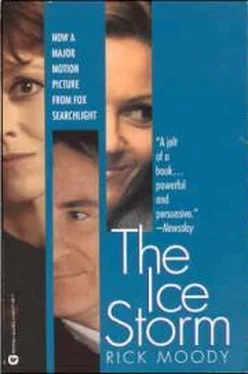— You what?
He began slowly, but then, as Hood re-created the details, he became a sort of erotic revenant. He gulped the last of his drink — his equilibrium was really beginning to fall away, like the first stage of an Apollo rocket. He reveled in the hot flashes, in the indignity of his predicament.
— I searched the house. I figured you were hiding, in a merry widow or something, in the closets, or else behind some piece of furniture. I figured you were there. I thought there was more to it than there was. So then I got to the bathroom and I saw the lingerie. I thought that it was part of a trail, a romantic trail or something, or it was a reminder of you. Something to be contemplated, you know, drunk in or something, you know? I was looking around, that’s all.
— You need help, Benjamin. That was just out to dry. I was leaving things out to dry. Delicates. What did you do with my clothes?
He was flattered by the degradation of his adultery, and as he told the story he felt its shame and joy. He knew he wished to be caught, that it was always the cuckold or the betrayed who was honored by the adulterer. And he was a liar, too, an exaggerator. Hood’s past lies swirled in this next moment of fiction, these past lies fluttered and squirmed in this liar’s chrysalis. He was thinking about padded expense accounts and cheating on exams as he spoke:
— I took it, the garter belt, to your dresser and buried it with its compatriots, with the lacy underthings, with the slips and panties and bras and stockings.
— Jesus, you are a mess, Benjamin. You’re a case history of hung-up behavior. Where’s your wife?
— I don’t know. She was a little upset about the, uh, bowl out front. She ran in ahead of me. Probably in the kitchen. Planning something, some covert activity in the kitchen.
He snickered desperately.
They moved over to the couch, a Stendig, designed by Ennio Chiggio and arranged in a semicircle with a big apostrophe at the end, where Hood now rested his weary feet. An earnest bunch of locals, dressed in plaid shirts and skirts and jackets, in double-knit trousers, in gray flannel, in velour and polyester, was conglomerated at the end of the couch, the system of islands. Dave Gorman, a fixture at the promiscuous events of New Canaan, was plundering the novels of Kurt Vonnegut, Jr. — the Dresden fire-bombing and Ice Nine — in an effort to impress a young and attractive woman beside him. Welcome to the Monkey House, he said, had been a seminal influence for him. No one on the end of the couch seemed to know what he was talking about. Gorman was in some kind of import/export business, which Hood figured meant drugs. And sure enough, as Gorman spoke he was lighting a flaccid little marijuana cigarette.
Hood had never tried the stuff though it turned up at the margins of New Canaan parties — to the consternation of the older generation, those who had been established in town for some time. But soon the joint came his way. Gorman leaned into Janey and Hood’s sullen truce:
— Benjamin, give it a try, why don’t you? This stuff will make some sense out of those larger questions. Promise you. Do yourself a favor.
Gorman grinned.
— Thanks for the advice, Dave, Hood said, waving the joint away affably. But then some carelessness overcame him, and he took up that tiny, aromatic cigarette and clamped it between his lips. He tugged on it, holding the smoke in his lungs, as he had seen it done on film and television.
— Good shit, he cackled, hacking and erupting with smoke as he passed it to Janey.
— Sure is good shit, Gorman said. It’s opiated. I had it in my chamber for a while. I was smoking this other—
— It’s what? Hood said.
— Don’t fret, Benj, it’s—
— Darn it, Dave.
Hood rose unsteadily, clapped his hand on the top of the modular sofa to steady himself, and stumbled, because it was nothing more than a piece of polyurethane mush, that sofa, steadied himself by grabbing hold of Janey, and then hastened to the bar, to preempt his new intoxication.
In the white noise of American conversation he picked up voices the way one discerns a particular orchestral instrument — the triangle, the viola d’amore — in the grand narrative sweep of a concerto or symphony. As he filled his drink, one name kept reappearing, like a leitmotiv. Milton Friedman. Across the room there was this extravagant praise for this economist who was violently opposed to the wage-and-price freezes of Nixon, who advocated such locally popular measures as the abolition of Social Security, the elimination of governmental aid to education, and the end of the minimum wage.
— Washington’s solution to a problem is a problem, too, said a voice as Hood loaded his glass using the impressively ample ice tongs. Take the control of airfares. Friedman said this in an interview. This is how the whole thing works. If you didn’t have this price fixing, airfares would be probably half of what they are now. Look at California. California has got its own airline within the state, and that’s an airline that’s not subject to the fare guidelines. None at all. Compare Sacramento to L.A. on Pacific Northwest with the price-fixed fares from L.A. to Reno — same distance more or less. Just look at the difference! The market prices are about 60 percent of the government’s prices -
Poor Madeline Gadd was stuck listening to this shit, and Hood was not surprised she was reapplying caramel-colored lipstick in a small compact mirror as she listened absently. Jack Moellering, the Friedman apologist, was, as he spoke, fixed raptly on the slit up the side of Madeline’s harem pants.
— Supply and demand… less restriction, Moellering was saying. Less restriction.
The laissez-faire stuff was really traveling around the room. Several feet away, by the mantel, Bobby Haskell, normally a guy who concentrated on paddle tennis to the exclusion of all other forms of conversation, was proposing that unions were a kind of labor monopoly, just an antitrust problem in the arena of labor.
These Friedman arias swooped around one another like the diverging themes of a duet, until Hood began to experience the opera of economics as just that, an opera, an opera full of good stories: the chance of great or mean birth, the influx and egress of fortunes honest and swindled, the plunging and soaring of government statistics along the g- and f-clefs of official statistical graphs and indexes. Friedman’s beloved money supply, new housing starts, durable goods, factory inventories, auto sales, and, of course, Variety’s top-grossing films of the week — each had its thrill of victory, its agony of defeat. Hood heard the long, bickering synopsis of lives in recitative, the surge of fine melody in an investment success, and the elaboration of a reversal in the sudden downturn in the market. The paisley and earth colors in the room swam before his intoxicated eyes, but the music of his business, the investment business, was music to his ears. America rose and fell on the melody of New Canaan’s songs of the economy. Songs sung by a Jewish economist and mimicked by WASPs who would have thought twice before playing golf with the guy.
Hood was capable of formulating one last coherent thought: they were all scattered like seeds, flying outward from the primal fist of Europe long ago. Hood circled the room alone, and no companion — not Elena, not Janey Williams, not George Clair or Dave Gorman (now slumped by himself on the modular sofa) — would salve his isolation. He was as alone as Elena, who couldn’t break a silence with a stranger, as alone as some fur trapper in the first light, in the wilderness of the new continent.
Janey was gone anyway, vanished. And so was George Clair. He didn’t recognize any of these people. Outside, in the dim light of outdoor lamps, snow accumulated. In the corner of the room, for a split second, Hood thought he saw Buddy Hackett.
Читать дальше












